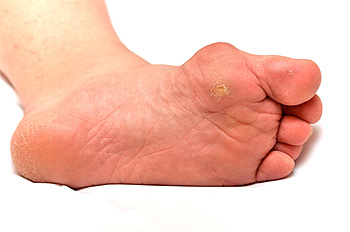

Corns are patches of thickened skin that develop on your feet, which can result from repetitive activities, wearing poorly fitting shoes, or underlying foot conditions. Among the different corn varieties, seed corns, also known as heloma miliare, can pose a unique challenge due to their small size, hardness, and often inconspicuous appearance on the soles of the feet. Seed corns are tiny, well-defined circular spots of hardened skin, commonly found in multiples on the sole where they create a distinctive pattern. Even though seed corns are often asymptomatic, they may cause discomfort or pain when pressure is applied, particularly in weight-bearing areas of the feet. Distinguishing seed corns from calluses is important for proper diagnosis and treatment. Unlike calluses, which are typically larger and can vary in shape, seed corns maintain a consistent round appearance. Additionally, calluses are more prone to form around the heel or the ball of the foot, while seed corns tend to cluster on the sole. For that reason, seed corns also can be mistaken for plantar warts. If you suspect you have a seed corn, it is suggested that you schedule an appointment with a podiatrist for an accurate diagnosis and appropriate treatment.
Corns can make walking very painful and should be treated immediately. If you have questions regarding your feet and ankles, contact the podiatrists of The Foot & Ankle Center of New Jersey. Our doctors will treat your foot and ankle needs.
Corns: What Are They? And How Do You Get Rid of Them?
Corns are thickened areas on the skin that can become painful. They are caused by excessive pressure and friction on the skin. Corns press into the deeper layers of the skin and are usually round in shape.
Ways to Prevent Corns
There are many ways to get rid of painful corns such as:
Treating Corns
Although most corns slowly disappear when the friction or pressure stops, this isn’t always the case. Consult with your podiatrist to determine the best treatment option for your case of corns.
If you have any questions please feel free to contact our office located in Ridgewood, NJ . We offer the newest diagnostic and treatment technologies for all your foot and ankle needs.